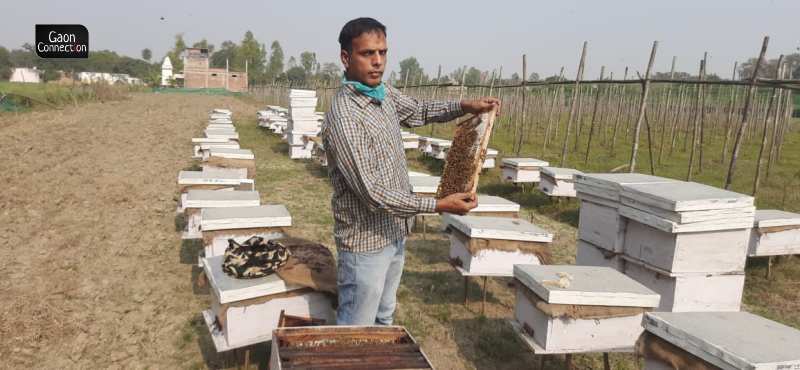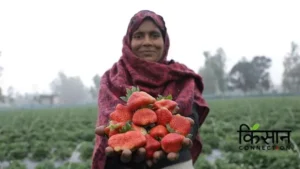After spending three years in Israel, observing, and researching as part of his post-doctoral fellowship, Nitin Singh decided to come back to India in 2015 to spread awareness about the importance of bees. He had developed an interest in bees while pursuing higher education in Israel. Under the guidance of his mentor Dr. Victoria Soroker, he was researching eco-friendly compounds that would treat parasitic diseases in bees.
“If there are no bees on the earth, we will be doomed. We do not have Planet B. We must save the earth, and to do that, bees are essential,” Singh said. “Unlike chemical pesticides, eco-friendly compounds won’t affect the bee-derived products,” the bee-keeper added.
Nitin Singh purchased 20 bee colonies from beekeepers in Rae Bareilly, Uttar Pradesh, and reared them. Once the colonies started growing, he started migrating the bee boxes to various parts of India. Today, he said, there are 1,200 colonies developed by his company Royal Honey and Bee Farming Society. He also met with farmers and explained to them the benefits of bee farming.
Also Read: Beekeeping gives the Santhal tribal women in Banka, Bihar, a sweet taste of success
Singh is based in Lucknow, the state capital of Uttar Pradesh, and works with farmers in Barabanki, Rae Bareilly, Sitapur, Kushinagar districts in the state. He also works with farmers from states like Tamil Nadu and West Bengal.
Bees are a farmer’s friend
“For example, if a farmer is cultivating a mustard field, she can easily install five bee boxes in her agricultural land. It will help to pollinate the flowers, and the farmer can also sell the honey. Bee farming improves crop yield by 30 per cent,” he informed. He also added that that bee farming was not investment heavy.
“The investment is totally up to the person. They can invest according to their budget. If you are taking five boxes, it will cost Rs 30,000,” Singh said, adding that bee farming improves the livelihood of farmers.
“The most important thing to note here is that you don’t need agricultural land to farm bees. Anybody can do this work. It is a relatively light job.”
Migrating bee boxes
“We migrate our bee boxes based on the crop cultivation season. For example, once the mustard cultivation ends in March in Uttar Pradesh, we migrate our boxes to the litchi cultivation area in Muzaffarpur [Bihar],” said Nitin Singh.
Also Read: Approaching winters are busy times for both bees and the bee-keepers
“When the sun sets, the bees to return to the boxes. We close the box and transport it via trucks,” he informed. The boxes must reach their destination before sunrise. If for some reason the boxes don’t reach the destination before sunrise, the boxes are opened where they are. “We allow the bees to collect nectar from that place, pack up and start for the destination two days later,” the bee-keeper explained.
In the initial days, Singh himself accompanied the bee boxes to their destination. So, he was traveling frequently. “Now we have established a system and use technology for communication.”
Beyond honey
Besides selling to farmers, Singh’s company extracts the honey, wax, and a compound called propolis from the bee boxes to sell various products like pure honey, honey energy drink, lip balm, soap, dental care, and candles.
He sells these items under the brand name Nitin’s bees in Ayurvedic stores across Uttar Pradesh and franchisee shops all over India. “We do not use any chemicals in our products. Our products are completely herbal, and bee-derived products never go bad,” Singh said.
Besides selling to farmers and creating his brand of products, Singh also provides technical consultations to beekeepers and budding entrepreneurs. “I have used my knowledge from my research to treat diseases in bees using natural remedies. I do not use any antibiotics.”
Now he has 15 years of experience in the field. Even then he encounters unexpected challenges now and then. Nature is the biggest challenge in this work, Singh said.
“If the mustard flowers do not bloom for some reason, how will the bees work? Global warming also has a huge effect on this, and we must evolve our agricultural practices along with it. It can also happen the field where the box is kept gets flooded due to an inclement weather event. Or a sudden unexpected rainfall or sleet can hamper the pollination process,” said the founder of Royal Honey and Bee Farming Society.
“My identity is shaped by bee farming. The insect provides livelihood, and I see myself as an entrepreneur,” he concluded.
Read the original article published here on Slow Bazaar.



















